Do you have a to-do list?
As writers, we spend a lot of time learning what “to do” in terms of plot, characterization, setting, pacing, and more.
We also try to learn what to do when it comes to social media, marketing, publishing, and other parts of the business side of writing.
Sometimes, though, it can be just as helpful to learn what “not to do.”
With that in mind, I’ve got seven important things every writer should add to his or her “not-to-do” list ASAP. These are things that are important to avoid for the sake of your own productivity, creativity, and writing sanity.
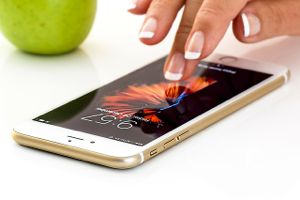 Not to-do list 1. Don’t take your cell phone to bed.
Not to-do list 1. Don’t take your cell phone to bed.
Taking your cell phone with you into the bedroom is like asking a rude neighbor to keep you up all night.
First of all, exposing yourself to the blue light right before sleep triggers your brain to stay awake and increases your risk of insomnia.
In a 2014 study, researchers found that participants who read an eBook before bed (which gives off the same type of blue light as a cell phone) took longer to fall asleep, were not as alert the next morning, and experienced a disruption to their natural circadian rhythms.
This type of light disrupts the production of melatonin, the hormone that helps you sleep. Worse, according to a 2013 study, “melatonin suppression by light at night has been linked to disease, such as cancer.”
Other studies have found that the radiation that cell phones regularly emit can also interfere with sleep. One found that those who were exposed took longer to enter deep sleep, which is critical for overall health. The scientists wrote, “The study indicates that during laboratory exposure to 884 MHz wireless signals, components of sleep believed to be important for recovery from daily wear and tear are adversely affected.”
Worse, animal studies have suggested that long-term exposure to cell phone radiation could be linked to some rare forms of cancer.
It’s just not worth it. Leave the cell phone in another room—optimally, turned off—and get a good night’s sleep. You need it to have the energy and focus to devote to your writing projects. (Read more about “Why Print Books are Much Healthier for Reading Before Bed.”)
 2. Don’t read or respond to emails first thing in the morning.
2. Don’t read or respond to emails first thing in the morning.
It may be hard to resist checking those emails first thing in the morning, but you know how it goes. You read a message from work and what happens? Your brain gets busy dealing with the issue brought up in the email. Whether those issues are of a negative or positive nature doesn’t matter. What does matter is the early interruption—you just allowed your brain and your energy to be hijacked by someone else’s needs.
This is especially dangerous if you write first thing in the morning. Anything that derails your thoughts and attention is going to make it much more difficult for you to focus on your next chapter. But even if you don’t write until later, you want to go about your day attacking your priorities first, not reacting to someone else’s, so leave the emails alone until you’ve accomplished at least one thing on your priority list.
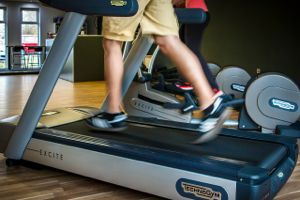 Not to-do list 3. Don’t neglect your exercise in favor of some other activity.
Not to-do list 3. Don’t neglect your exercise in favor of some other activity.
How many times have you neglected your exercise routine because you felt you had to accomplish something else? If it happens more than once in a great while, that’s bad news—both for your health and for your writing.
Exercise is key for both physical and mental health. You know that it’s important for maintaining a healthy weight, and for reducing your risk of some of today’s most deadly diseases, including heart disease, stroke, and cancer. But exercise also helps stoke your creativity. Wendy Suzuki, author of Healthy Brain, Happy Life, states that exercise helps people come up with new ideas, and induces changes in the brain that may help improve memory and imagination.
Haruki Murakami, author of What I Talk About When I Talk About Running: A Memoir, says that he started running every day after he became a writer. In an interview with “Runner’s World,” he noted that not only did he run to stay in good physical shape and counteract the hours of sitting and writing, but to help empty and relax his mind.
“I try not to think about anything special while running,” he said. “As a matter of fact, I usually run with my mind empty. However, when I run empty-minded, something naturally and abruptly crawls in sometime. That might become an idea that can help me with my writing.” He adds that running helps “cool down my nerves that get heated up while writing.”
Give yourself and your work the gift of exercise, at least five days a week!
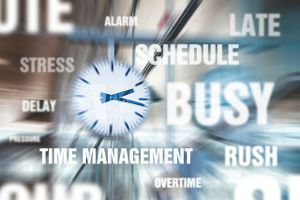 Not to-do list 4. Don’t pack your schedule so high you have no time for boredom or daydreaming.
Not to-do list 4. Don’t pack your schedule so high you have no time for boredom or daydreaming.
Writers today are busy busy busy. We’re writing and blogging and marketing and keeping our social media feeds updated. We’re submitting and querying and reading and educating ourselves on whatever we don’t know yet. Most of us are also working day jobs and/or caring for families, which leaves us little if any downtime.
That constant go-go-go type of schedule wreaks havoc on creativity. Researchers reported in 2014 that doing something boring (like reading a phone book) before doing something creative resulted in more creative work. They theorized that during the boring activity, participants engaged in daydreaming, which encouraged creativity in the next task.
As a creative individual, you need time each day to just “space out.” Schedule in at least 30 minutes to do just that. Many writers achieve this while they’re exercising, effectively combining two activities into one. If your exercise routine requires more focus than that, though, you need to schedule in some time to be bored and just “do nothing.”
Try giving yourself 30 minutes at the end of the day, just you and your journal. Take the first 10 minutes to dump everything on the page—your worries, problems, and anything you have to deal with the next day—and then use the other 20 minutes to do something that will allow your brain to wander. Drawing, coloring, knitting, and other similar quiet activities all work well.
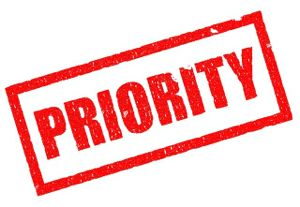 Not to-do list 5. Don’t fritter away your time on busywork—do the important things first.
Not to-do list 5. Don’t fritter away your time on busywork—do the important things first.
Do you find that on some days you didn’t get to your writing because you had too many other things to do, but then when you think back, you can’t remember what some of those things were?
If this happened to you, most likely it was because you spent too much time on “busy work”—answering emails, cleaning out files, catching up on your to-do lists, and the like. Unfortunately, committing too much of your time to activities like these may make you feel good early on (“look at all I got done!”), but inevitably will make you feel bad when you realize you didn’t get to spend time on those things that really matter to you.
We waste time on these smaller tasks even when our larger priorities are more important to us for one reason: it’s easier to do the small stuff. A 2014 survey from AtTask and Harris Poll reported that U.S. employees spend only about 45 percent of their day on primary job duties. The rest is spent on email, meetings, administrative tasks, and interruptions.
What may surprise you is that research has also shown that we are actually happiest when doing these minimal tasks.
“With rote work, you get a feeling of accomplishment, but you haven’t exerted a lot of mental activity,” study author Gloria Mark of the University of California, Irvine, told the Wall Street Journal. “It gives you a feeling of fulfillment, but there’s not frustration or stress.”
If you allow yourself to do busy work before getting to your priorities, you’re falling into a non-productive trap that will leave you unhappy and unfulfilled. Tackle your biggest priority early on in the day, and then set specific times during the week when you will catch up on the small stuff. Never allow it to take over your time and energy, at least not before you get your writing done!
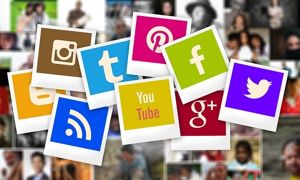 6. Don’t peruse social media throughout the day—set 1-2 times and limit each.
6. Don’t peruse social media throughout the day—set 1-2 times and limit each.
Social media networking now accounts for nearly thirty percent of the time Americans spend on the Internet—an average of 1.72 hours a day, according to a 2015 report from the Global Web Index. That doesn’t include blogging, reading blogs, or online research, just social media interaction.
A 2015 report from Informate Mobile Intelligence revealed that people check Facebook, Twitter, and other accounts an average of seventeen times a day—once every waking hour. And the highest usage wasn’t in the “kids” group —it was in the 25-54 age bracket.
Social media networking can help writers in many ways, but it can also be a huge time thief. If you’re checking it throughout the day, you may be losing precious time you could be devoting to your writing instead. Don’t “peruse” if you can help it. Dedicate thirty minutes a day, for example, to reviewing your feeds, and otherwise avoid the apps. Be vigilant about stopping on time, so you don’t fall victim to the “just one more thing” trick the social media thief uses to keep you from breaking away.
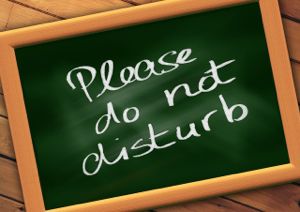 Not to-do list 7. Don’t allow interruptions to your writing time.
Not to-do list 7. Don’t allow interruptions to your writing time.
Interruptions are costly. They increase errors, cause you to take longer to finish a task, and boost stress. A key 2014 study from George Mason University found that people who were interrupted while writing produced poorer quality essays than those who worked undisturbed. Other research has found that it can take an average of twenty-three minutes to recover lost concentration.
Don’t allow your writing time—or any other time that’s important to you—be interrupted by anything less than an emergency. To work or write uninterrupted, make it clear to others that you don’t want to be disturbed. Close your door. Don’t answer the phone or check emails. Hang a “do not disturb” sign. Whatever it takes.
Don’t answer the phone or the door. When unexpected visitors come calling, avoid any interaction at all, or at the very least, apologize and reschedule the visit. Turn off your cell phone, or at least silence it, and isolate yourself—go somewhere you won’t be disturbed.
What do you think writers should put on their “not-to-do” list?
Note: For more on increasing your productivity as a writer, see Overwhelmed Writer Rescue. Get your free chapters here.
Sources
At Work – WSJ. (2014, March 3). Retrieved from https://blogs.wsj.com/atwork/2014/03/03/
Chang, A., Aeschbach, D., Duffy, J. F., & Czeisler, C. A. (2014). Evening use of light-emitting eReaders negatively affects sleep, circadian timing, and next-morning alertness. Proceedings of the National Academy of Sciences, 112(4), 1232-1237. Retrieved from http://www.pnas.org/content/pnas/112/4/1232.full.pdf
Chang, L. (n.d.). Americans spend an alarming amount of time checking social media on their phones. Retrieved from https://www.digitaltrends.com/mobile/informate-report-social-media-smartphone-use/
Elpidorou, A. (2014). The bright side of boredom. Frontiers in Psychology, 5. doi:10.3389/fpsyg.2014.01245
Lam, B. (2018, January 29). The Wasted Workday. Retrieved from https://www.theatlantic.com/business/archive/2014/12/the-wasted-workday/383380/
Lean, G. (2008, January 20). Mobile phone radiation wrecks your sleep. Retrieved from http://www.independent.co.uk/life-style/health-and-families/health-news/mobile-phone-radiation-wrecks-your-sleep-771262.html
Lee, Y. (2015, November 4). I’m A Runner: Haruki Murakami. Retrieved from https://www.runnersworld.com/celebrity-runners/im-a-runner-haruki-murakami
Loria, K. (2016, November 4). Exercise might be more than good for your brain—it could make you more creative as well. Retrieved from http://www.businessinsider.com/exercise-benefits-brain-creativity-stress-2016-11
Mander, J. (2017, May 16). Social Media Usage Rises To 2+ Hours Per Day | GlobalWebIndex. Retrieved from https://blog.globalwebindex.net/chart-of-the-day/daily-time-spent-on-social-networks/
Maron, D. F. (2016, May 27). Major Cell Phone Radiation Study Reignites Cancer Questions. Retrieved from https://www.scientificamerican.com/article/major-cell-phone-radiation-study-reignites-cancer-questions/
Wood, B., Rea, M. S., Plitnick, B., & Figueiro, M. G. (2013). Light level and duration of exposure determine the impact of self-luminous tablets on melatonin suppression. Applied Ergonomics, 44(2), 237-240. Retrieved from https://www.sciencedirect.com/science/article/pii/S0003687012001159

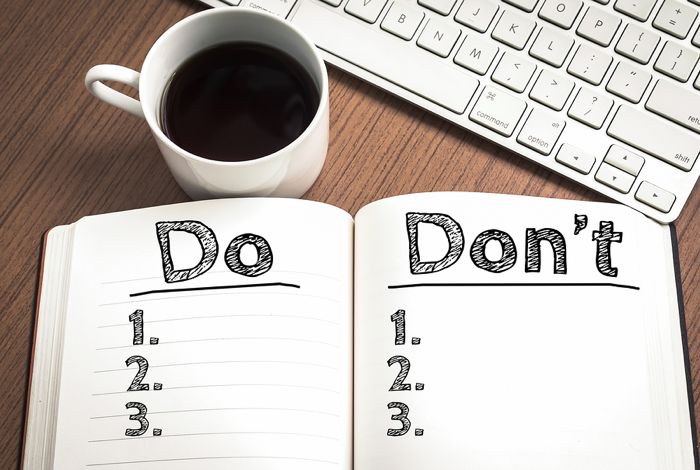
Great list, Colleen. I find it very difficult to write after I’ve attended to emails. Much better to write first.
Thanks, Jo-Anne! Yes, always works better. :O)
Very good advice, thank you!
My Kindle Fire has a setting called “blue shade” that purports to block the blue light from the screen when playing a quick word game or reading to relax before bedtime. I have never had any problem falling asleep after reading, so I have to assume that it works, at least for me. ☺
Yes, I’ve heard of those settings on Kindle, Kadee, plus the ones that have no light at all. Glad that’s working for you!
There is so much good “don’t” advice here, Colleen. For some folks, fighting that phone/social media addiction is proving to be very difficult. I’m happily unattached to the cell phone, rarely answer the landline, and have whittled my social media visits down to 2-3 times a day. I think I’m a healthier person because of these changes, mostly because I’m sleeping so much better.
Such a good testimonial to taking control of the technology, Pat! Thank you. :O)
Ha! I read this after finding the link while (blush) reading and responding to emails first thing in the morning. It’s a habit I’ve been trying to break. Some days I’m good at resisting, but other days, like today, my resolve weakens. This is a good reminder to keep working on changing my patterns.
Ha ha ha. Well of course Writing & Wellness emails are the exception, right? :O) I know what you mean, Nan. I sometimes have to sneak a peak too, but then when I see a work-related one that gets my thoughts moving in that direction (and away from morning writing) I recommit!